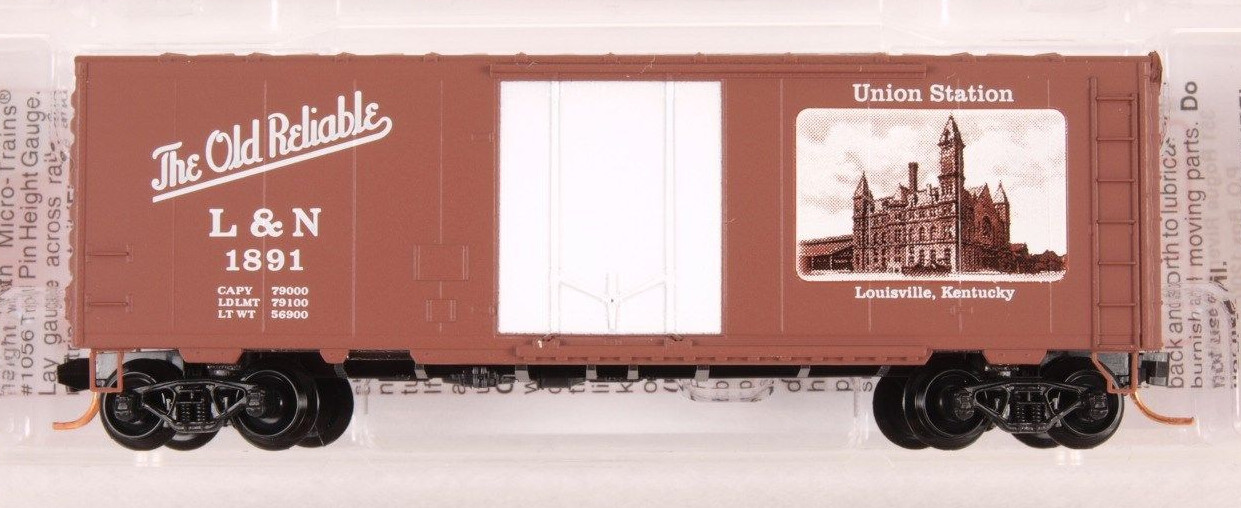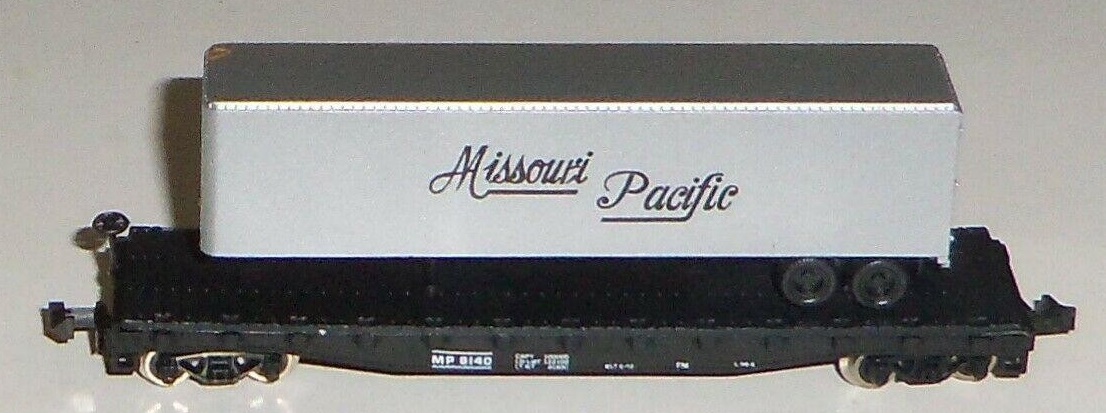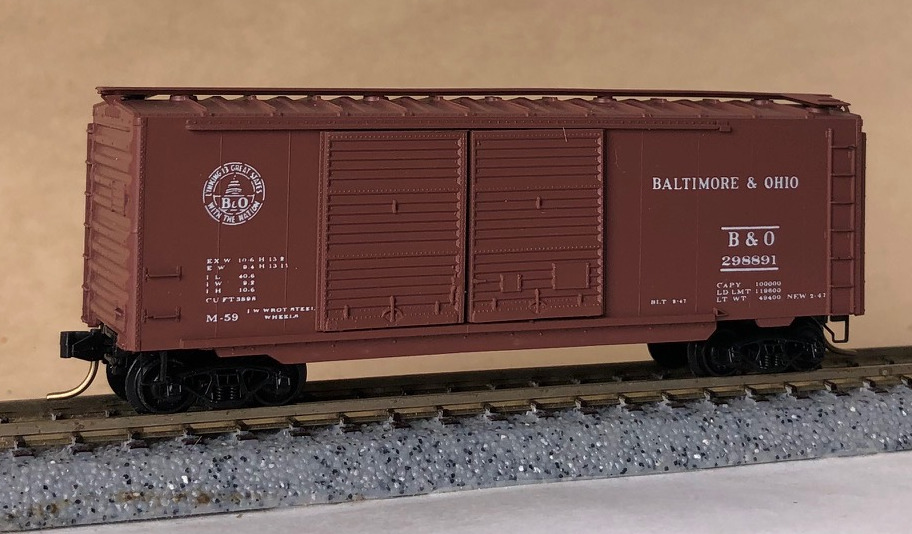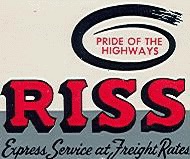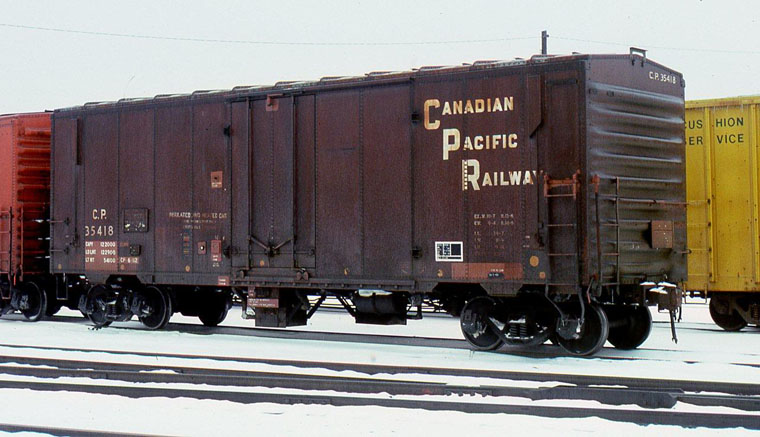Specific Item Information: N Scale Collector 8th annual membership car.
Model Information: Model: Introduction: July 1996. This body style (074) has no roof walk and short ladders.
Unlike the traditional "sliding" door, the plug door system closes with a final inward movement (similar to most van sliding doors) that seals the door flush with the interior of the boxcar. This provides a much better seal than the sliding door boxcar. A rotating lever on the door activates a gear system to "plug" and "unplug" the door.
Unlike the traditional "sliding" door, the plug door system closes with a final inward movement (similar to most van sliding doors) that seals the door flush with the interior of the boxcar. This provides a much better seal than the sliding door boxcar. A rotating lever on the door activates a gear system to "plug" and "unplug" the door.
Prototype History: Plug-Door boxcars are usually insulated and typically carry products such as canned goods that require protection from extremes of temperature but do not require refrigeration. Plug-style doors were normally used to ensure a tight seal in the insulation. Designed for transport of both perishables and large loads, plug doors allowed box cars to be sealed from outside dust and dirt. Cars like these were manufactured during the 50s and 60s.
Whether you consider this a reefer or a boxcar is a matter for angel-pinhead-counters. There seems to be a bit of a blurry line during the transition era between the idea of a steel ice reefer and an insulated boxcar. I guess an ice reefer was meant to hold ice for cooling but I doubt this is a cut-and-dry distinction. Modern "mechanical" reefers are a different breed as they contain a refrigeration unit which quite distinctly sets them apart from "boxcars".
Whether you consider this a reefer or a boxcar is a matter for angel-pinhead-counters. There seems to be a bit of a blurry line during the transition era between the idea of a steel ice reefer and an insulated boxcar. I guess an ice reefer was meant to hold ice for cooling but I doubt this is a cut-and-dry distinction. Modern "mechanical" reefers are a different breed as they contain a refrigeration unit which quite distinctly sets them apart from "boxcars".
Road Name History: The Louisville and Nashville Railroad (reporting mark LN), commonly called the L&N, was a Class I railroad that operated freight and passenger services in the southeast United States.
Chartered by the Commonwealth of Kentucky in 1850, the road grew into one of the great success stories of American business. Operating under one name continuously for 132 years, it survived civil war and economic depression and several waves of social and technological change. Under Milton H. Smith, president of the company for thirty years, the L&N grew from a road with less than three hundred miles (480 km) of track to a 6,000-mile (9,700 km) system serving thirteen states. As one of the premier Southern railroads, the L&N extended its reach far beyond its namesake cities, stretching to St. Louis, Memphis, Atlanta, and New Orleans. The railroad was economically strong throughout its lifetime, operating both freight and passenger trains in a manner that earned it the nickname, "The Old Reliable."
Growth of the railroad continued until its purchase and the tumultuous rail consolidations of the 1980s which led to continual successors. By the end of 1970, L&N operated 6,063 miles (9,757 km) of road on 10,051 miles (16,176 km) of track, not including the Carrollton Railroad.
In 1971 the Seaboard Coast Line Railroad, successor to the Atlantic Coast Line Railroad, purchased the remainder of the L&N shares it did not already own, and the company became a subsidiary. By 1982 the railroad industry was consolidating quickly, and the Seaboard Coast Line absorbed the Louisville & Nashville Railroad entirely. Then in 1986, the Seaboard System merged with the C&O and B&O and the new combined system was known as the Chessie System. Soon after the combined company became CSX Transportation (CSX), which now owns and operates all of the former Louisville and Nashville lines.
Read more on Wikipedia.
Chartered by the Commonwealth of Kentucky in 1850, the road grew into one of the great success stories of American business. Operating under one name continuously for 132 years, it survived civil war and economic depression and several waves of social and technological change. Under Milton H. Smith, president of the company for thirty years, the L&N grew from a road with less than three hundred miles (480 km) of track to a 6,000-mile (9,700 km) system serving thirteen states. As one of the premier Southern railroads, the L&N extended its reach far beyond its namesake cities, stretching to St. Louis, Memphis, Atlanta, and New Orleans. The railroad was economically strong throughout its lifetime, operating both freight and passenger trains in a manner that earned it the nickname, "The Old Reliable."
Growth of the railroad continued until its purchase and the tumultuous rail consolidations of the 1980s which led to continual successors. By the end of 1970, L&N operated 6,063 miles (9,757 km) of road on 10,051 miles (16,176 km) of track, not including the Carrollton Railroad.
In 1971 the Seaboard Coast Line Railroad, successor to the Atlantic Coast Line Railroad, purchased the remainder of the L&N shares it did not already own, and the company became a subsidiary. By 1982 the railroad industry was consolidating quickly, and the Seaboard Coast Line absorbed the Louisville & Nashville Railroad entirely. Then in 1986, the Seaboard System merged with the C&O and B&O and the new combined system was known as the Chessie System. Soon after the combined company became CSX Transportation (CSX), which now owns and operates all of the former Louisville and Nashville lines.
Read more on Wikipedia.
Brand/Importer Information: Micro-Trains is the brand name used by both Kadee Quality Products and Micro-Trains Line. For a history of the relationship between the brand and the two companies, please consult our Micro-Trains Collector's Guide.
Manufacturer Information:  Micro-Trains Line split off from Kadee Quality Products in 1990. Kadee Quality Products originally got involved in N-Scale by producing a scaled-down version of their successful HO Magne-Matic knuckle coupler system. This coupler was superior to the ubiquitous 'Rapido' style coupler due to two primary factors: superior realistic appearance and the ability to automatically uncouple when stopped over a magnet embedded in a section of track. The success of these couplers in N-Scale quickly translated to the production of trucks, wheels and in 1972 a release of ready-to-run box cars.
Micro-Trains Line split off from Kadee Quality Products in 1990. Kadee Quality Products originally got involved in N-Scale by producing a scaled-down version of their successful HO Magne-Matic knuckle coupler system. This coupler was superior to the ubiquitous 'Rapido' style coupler due to two primary factors: superior realistic appearance and the ability to automatically uncouple when stopped over a magnet embedded in a section of track. The success of these couplers in N-Scale quickly translated to the production of trucks, wheels and in 1972 a release of ready-to-run box cars.
Micro-Trains Line Co. split off from Kadee in 1990 to form a completely independent company. For this reason, products from this company can appear with labels from both enterprises. Due to the nature of production idiosyncrasies and various random factors, the rolling stock from Micro-Trains can have all sorts of interesting variations in both their packaging as well as the products themselves. When acquiring an MTL product it is very important to understand these important production variations that can greatly enhance (or decrease) the value of your purchase.
Please consult our Micro-Trains Collector's Guide

Micro-Trains Line Co. split off from Kadee in 1990 to form a completely independent company. For this reason, products from this company can appear with labels from both enterprises. Due to the nature of production idiosyncrasies and various random factors, the rolling stock from Micro-Trains can have all sorts of interesting variations in both their packaging as well as the products themselves. When acquiring an MTL product it is very important to understand these important production variations that can greatly enhance (or decrease) the value of your purchase.
Please consult our Micro-Trains Collector's Guide
Item created by: gdm on 2016-08-21 15:10:41. Last edited by Alain LM on 2021-06-06 10:49:07
If you see errors or missing data in this entry, please feel free to log in and edit it. Anyone with a Gmail account can log in instantly.
If you see errors or missing data in this entry, please feel free to log in and edit it. Anyone with a Gmail account can log in instantly.


